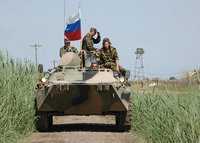Has Russia betrayed Ukraine's breakaway republics?
On June 25th, the Federation Council of Russia revoked the decree from March 1, which empowered the Russian president with the right to deploy Russian troops in Ukraine. However, there is another "indefinite" decree left in reserve, passed in 2009, the Vedomosti wrote.

According to the newspaper, the Federation Council issued a similar decree to then-President Dmitry Medvedev in 2009. The decree gave powers to the sitting Prime Minister, who then served as the head of state, to "operationally use Russian Armed Forces overseas."
It was also said that the decree had not been withdrawn formally, although its cancellation was not required."
Deputy Chairman of the Federation Council Committee on Constitutional Legislation and State Structure, Konstantin Dobrynin, is certain that now the situation is completely different. The Constitution of the Russian Federation does not provide for a separate procedure for canceling a decision that entitles the president to send troops to other countries.
A source in the Russian Defense Ministry confirmed that the permission to send troops to other countries, given to the president in 2009, "of course, continues to stay in effect." The document was adopted to be able to use armed forces immediately in case of, for example, a nuclear or a missile attack on Russia, when obtaining the same permission from the House of Parliament is impossible. It was said that the decree would be valid if combat actions in eastern Ukraine either spread to the territory of the Russian Federation, or carry a threat to the lives of civilians on both sides of the border.
Earlier, Putin's press secretary, Dmitry Peskov, said that the Russian president sent an appeal to the Federal Council with a proposal to withdraw the decree entitling the head of state to deploy Armed Forces of the Russian Federation on the territory of Ukraine. The Federation Council revoked the permission on June 25th.
Deputy head of the department of post-Soviet countries of the Russian State Humanitarian University, Associate Professor Alexander Gushchin, said in an interview with Pravda.Ru that the leaders of the breakaway republics of Ukraine may do believe that Russia has betrayed them.
"Of course, now many in the People's Republics of Donetsk and Luhansk may believe that Russia has betrayed Novorossia. However, I would like to note here that Russia has not recognized the republics. Russia has not recognized the results of the referendum. Therefore, one should not draw a parallel between our country's position in relation to these Ukrainian republics and Russia's stance on Abkhazia and South Ossetia, even Transnistria.
Secondly, taking into consideration the subjectivity of the republics of Donetsk and Luhansk, as well as the right of their people to express their will, there are other parties to the process of negotiations, such as Washington. The future of the Ukrainian crisis and its resolution lies in the plane of the multivariate international consensus, between Washington and Moscow, first and foremost.
Washington was running radical policies to get Russia involved in this conflict. At first glance, it might have helped people, but it could greatly harm Russia from the point of view of international image.
The process of negotiations has started. The agenda of the talks includes issues of gubernatorial elections, local councils and decentralization. However, representatives of the east of Ukraine do not take part in the talks, so the situation is fragile. Putin decided not to use Russian troops in Ukraine, but this is a PR step.
Russia shows that she participates in the negotiation process. However, if the situation worsens, Kiev will continue the punitive operation, and Putin will be able to disavow yesterday's decision."
"Do you think that one of the strategic objectives of the decision was to create public opinion in Europe? Putin then flew to Austria immediately, where he signed the agreement on the South Stream project."
"Absolutely. Russia's ties with Europe are so serious that even the Ukrainian crisis should not affect them. It has affected them already, of course, but strategic relationships with Europe can not be substituted with strategic relationships in the East.
Russia has always been a part of European politics, an important factor in European politics. It was the case in the XIX century, when Russia was superpower number one, after Napoleon. It was the case in Soviet times too.
Today, the West uses the "South Stream" factor as one of the elements of Western pressure on us. Yet, this is a factor that allows Russia to build economic relations with Europe."
"How will Russia support the People's Republics of Donetsk and Luhansk?"
"The same it does now. Putin's decision does not deprive Russia of its ability to help volunteers and support these two unrecognized republics. Putin's most recent move was a signal to Kiev. From a strategic point of view, I believe that it can not be regarded as a betrayal of the breakaway republics of Donetsk and Luhansk. The interests of Russia are mentally and ideologically similar to the interests of the people living in those republics. However, there are also things that bind us on a more global, international level. No matter what kind of relations Russia may have with Ukraine, we can not ignore global processes."
Pravda.Ru
Subscribe to Pravda.Ru Telegram channel, Facebook, RSS!


